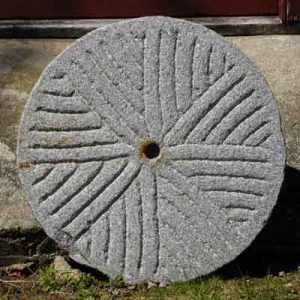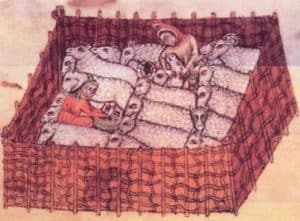Bread was a staple of the villagers’ diet. Wheat was milled to make flour at the water mill on the river Mole. Water mills use moving water to power two revolving grinding stones, which grind corn between them into flour for bread. The force of the water drives the blades of the mill wheel which rotates an axle that drives the stones.

The mill was owned by the lord of the manor, who usually made a good profit from it, as all the manor’s tenant farmers had to have their grain ground at the lord’s mill, and the miller paid him rent.
In the years before 1300 the miller paid a rent of over £6 per year.
But in 1300 the miller was unable to grind corn for a large part of the year. A new mill-stone was needed. The manor’s reeve and Master Bacheler, the miller, travelled to London to purchase the new mill-stone. A manor’s miller would usually accompany the reeve to buy a new stone to ensure a match the stone it was to be paired with.

The reeve oversaw the working of the lord’s lands, where many of the peasants had to work at certain times of the year. He managed the peasants, their work, and much of the manor’s finances. Manors usually sent the reeve to negotiate the price and arrange transport for a new stone.
The reeve and miller probably walked to London in a day, then spent a day arranging purchase and transportation, before returning with the mill-stone. Two nights at an inn would have cost them about half a penny to a penny plus 1½ to 2 ½ pennies for food (more if they had meat or wine). They probably took bread and cheese to eat on the road.

Robin the miller from Chaucer’s ‘Canterbury Tales’, which was published in the 1380s. Chaucer’s drunken miller tells a bawdy tale of adultery.

The best mill-stones in the 1300s came from France. Villages like Betchworth had a good choice in London, where stones arrived by sea and river. The stones weighed nearly a ton and were unloaded by crane at Kingston.
In Betchworth the miller paid a high rent and the lord paid for repairs to the mill. In neighbouring Brockham the miller paid a small rent and had to pay for repairs himself.
The new mill-stone was transported by river to Kingston. From there it came by ox-drawn wagon slowly down to Betchworth. The manor had to pay for transportation of the stone; the men’s food and drink; and the wine to seal the bargain. It also had to pay for preparation and fitting of the stone into place.
Transportation of such a heavy item over considerable distances by boat and wagon made the purchase of a new mill-stone an expensive undertaking.
The cost of a new mill-stone
From the Manorial Accounts for 1299-1300.
Prices are shown in shillings (s) and pennies (d). The total was 67s 8d (between £3 and 4).
| For a mill-stone purchased | 60s | |
| For conveying the same mill-stone from the house from where it was bought | 18d | |
| For wharfage of the same | 1d | |
| For wine for beverage [with the seller] | 16d | |
| For carrying the same mill-stone by water to Kingston | 16d | |
| For getting out of the boat and loading it on a wagon | 9d | |
| Pay of a carpenter for repairing the beam of the said mill-stone and bedding it accurately for the task | 15d | |
| For the expenses of the reeve and the miller in London when choosing the same mill-stone | 12d | |
| For perforating the said mill-stone | 6d | |
| For timbers and billets for raising the said mill-stone | [blank] | |
| For making anew the spindle of the mill-stone | 3s 1d | |
| For forage bought for the oxen fetching the same mill-stone at Kyngstone | 4d | |
| For planks for cutting the weir of the mill | 2s | |
| For receipts of Master W Bacheler in default of the rent of the mill this year because he has not ground for a great part of the year owing to the lack of mill-stone | 33s 8d |
Last : Introduction
Next : Church Life


